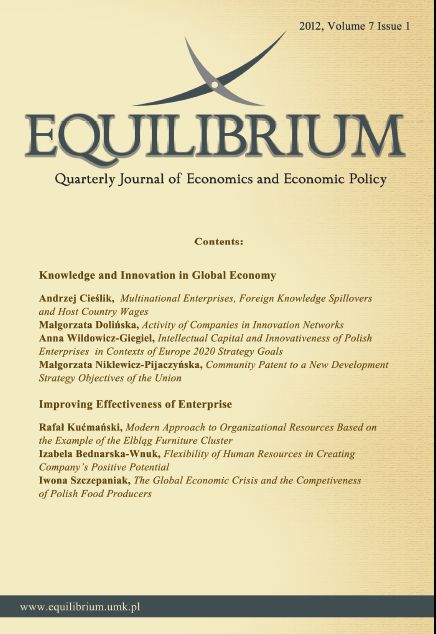Modern Approach To Organizational Resources Based On The Example Of The Elbląg Furniture Cluster
DOI:
https://doi.org/10.12775/EQUIL.2012.005Keywords
clusters, small and medium enterprises, innovations in organizationAbstract
The Lisbon Strategy, which is implementing a new type of economic policy, is intended to change the economy of the European Union into a knowledge-based economy which will be the most competitive economy in the world. This should lead to sustainable economic growth by, among other things, providing a bigger number of better jobs and greater social cohesion. The issues of the development of competitiveness and innovativeness in European regions, which have their roots in the Lisbon Strategy and have transformed into the Regional Innovation Strategies, have become increasingly popular and significant. One of the tools facilitating this development is undoubtedly the cluster. The purpose of the present article is to outline new approaches to the world economy. It also presents an innovative dimension of co-operation as well as various forms of organizing contemporary entrepreneurship.References
Marshall A. (1925), Zasady ekonomiki, M. Arct, Warsaw 1925 – Polish translation of the publication from 1890.
Porter M. E. (1990), The Competitive Advantage of Nations, Free Press, New York.
Porter M.E. (2001), Grona a konkurencja, [in:] M.E. Porter, Porter o konkurencji, PWE, Warsaw.
Kowalak B. (2007), Znaczenie klastrów dla rozwoju gospodarki, Ministerstwo Gospodarki, Departament Instrumentów Wsparcia, Warsaw, http://www.paiz.gov.pl/files/?id_plik=8800, p. 34.
Ministry of Regional Development (2007), the Development of Cluster Structures in Eastern Poland – Synthesis, MRR, Warsaw.
Jabłoński M. (2009), Comments on the document titled ‘The Directions and Policy of the Development of Clusters in Poland’, ConnectionPoint, p. 3.
Downloads
Published
How to Cite
Issue
Section
Stats
Number of views and downloads: 182
Number of citations: 0



